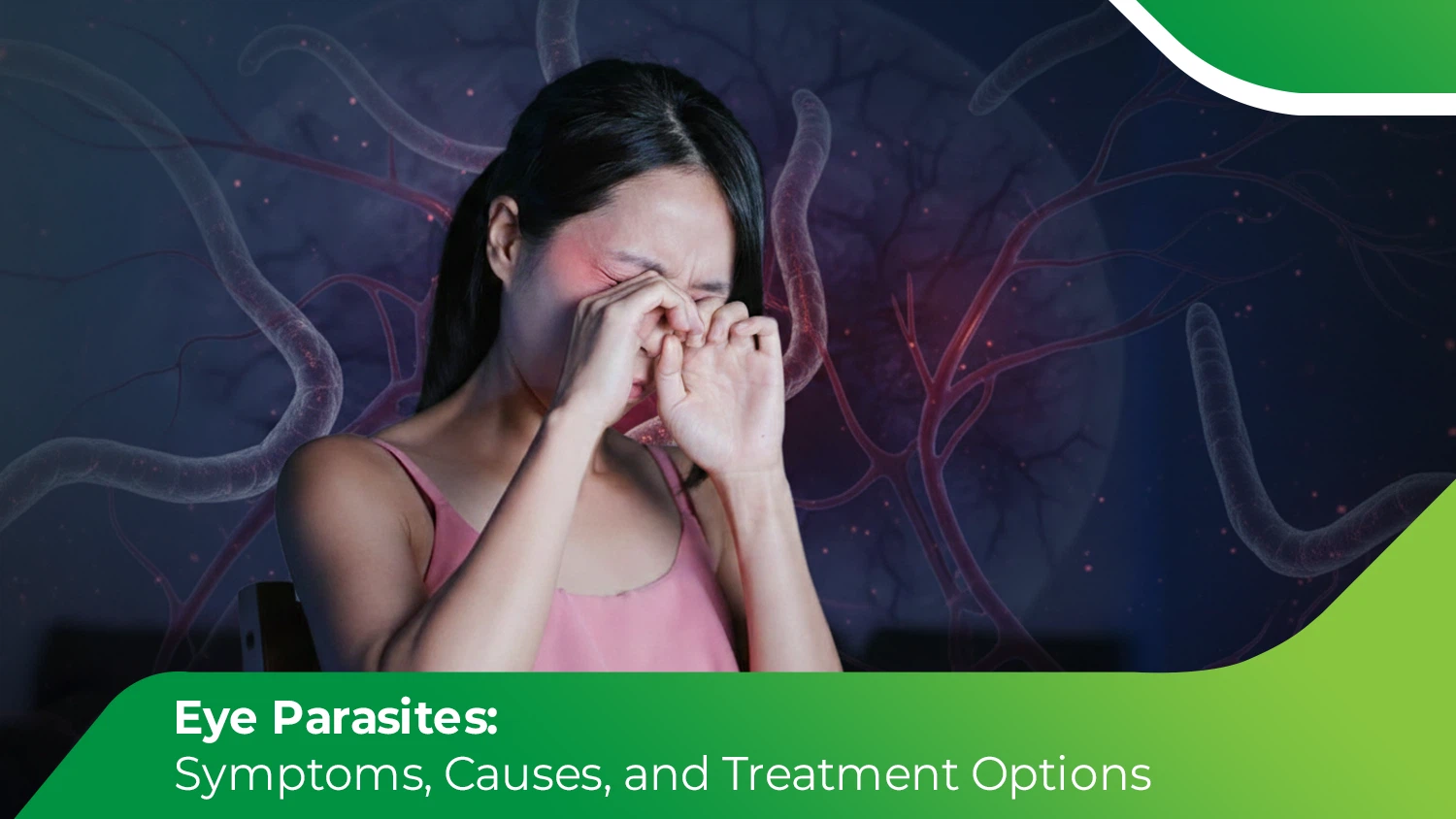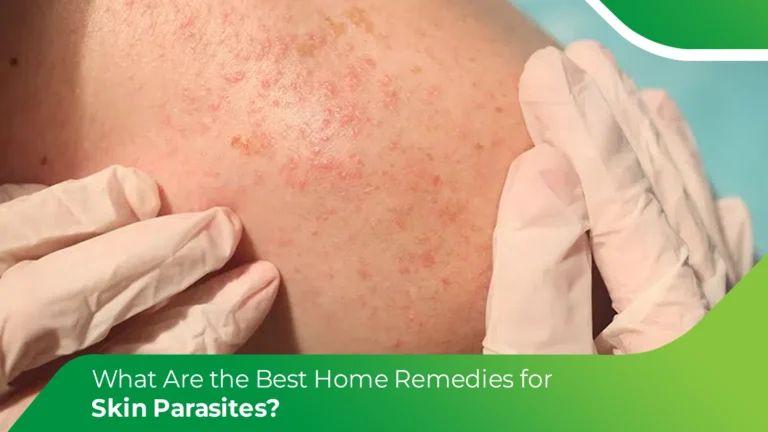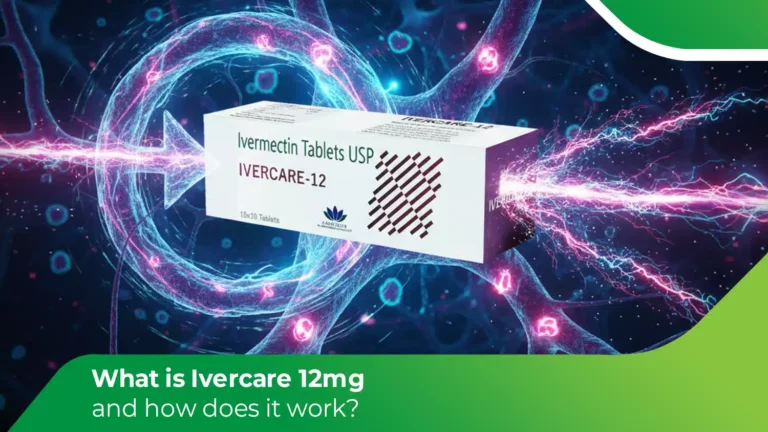It’s important to understand eye parasites and what to look out for, as detecting them early can make treatment easier. If ignored, eye parasites can cause some uncomfortable and serious problems. If people know the signs and symptoms, they can get help sooner, which usually leads to better outcomes. Taking action not only helps your health but also helps keep the community safe by stopping infections from spreading.
Also, knowing what causes eye parasites can help you avoid getting them in the first place. Learning how these parasites spread and where they like to hang out can help you take steps to protect yourself, like avoiding certain places or keeping up with good hygiene. Being informed is a great first step in keeping these pests away.
What Are Eye Parasites?
Eye parasites are slight organisms that can invade the eye and tissue around it, which can lead to various eye problems. These parasites can be so small that you can’t see them, like some protozoa and certain worms, or they can be bigger, like some insects. They can cause discomfort, and swelling, and even affect your vision. Common eye parasites include Acanthamoeba, Toxoplasma gondii, and some types of worms. Each of these has its own life cycle and way of spreading.
For example, Acanthamoeba is an amoeba that lives in water and soil. It can cause a serious infection called Acanthamoeba keratitis, especially in people who wear contact lenses. Toxoplasma gondii is another parasite often linked to cats and can cause problems for people with weak immune systems. It’s important to know about these parasites and how they work if you care about keeping your eyes healthy.
Symptoms of Eye Parasites
Eye parasites can cause different symptoms based on the type and how bad the infection is. Some common signs are red eyes, lots of tearing, blurry vision, and a feeling like there’s something in your eye. You might also feel pain, be sensitive to light, and notice swelling around your eye.
If the infection gets worse, it can lead to corneal ulcers, which hurt a lot and could even cause lasting vision problems if not treated quickly. For example, Acanthamoeba keratitis might start with just a bit of irritation but can turn into severe pain and vision loss if you don’t get help soon. So, it’s really important to catch these symptoms early for the best chance of getting better.
Some people might also feel other symptoms like a fever or general tiredness, which can show that the infection isn’t just in the eye. If you’re having these issues, it’s important to see a doctor right away to avoid more serious problems.
Causes of Eye Parasite Infections
Knowing what causes eye parasite infections can really help in keeping them at bay. You can catch eye parasites in a few ways, like coming into contact with dirty water, soil, or surfaces. Take Acanthamoeba, for instance, it’s often found in natural water and can get into your eyes when swimming, using tap water to clean your contact lenses, or even if you touch your face with dirty hands.
Another one is Toxoplasma gondii, which mainly spreads through touching cat poop or eating meat that isn’t cooked well. If you have cats or work where they are around, you should be extra careful to avoid getting infected. Also, not washing your hands before touching your face or eyes can easily lead to parasites making their way to your eyes.
Where you live can also impact how common these parasites are. Some areas might have more cases because of their weather or environment. Being aware of these causes can help you make smarter choices to stay healthy.
Diagnosis of Eye Parasite Infections
To diagnose eye parasite infections, an eye care professional usually starts with a thorough eye exam. The doctor will look at the patient’s symptoms, their medical background, and any possible exposure to risks. Sometimes, they might need to run diagnostic tests to confirm if a parasite is present.
One common test is corneal scraping, where they take a small sample from the eye’s surface and check it under a microscope to see what type of parasite is causing the problem. In some cases, they may use imaging tools like optical coherence tomography (OCT) to see how bad the infection is and if it has damaged any eye structures.
They might also do blood tests to look for any other infections, especially if Toxoplasma gondii is suspected. Getting a quick and accurate diagnosis is important because the treatment can vary a lot depending on which parasite is causing the infection.
Treatment Options for Eye Parasite Infections
Treating eye infections caused by parasites can be a bit different depending on the type of parasite and how serious the infection is. For example, Acanthamoeba keratitis is usually handled with a mix of topical antiseptics and medicines that target the amoeba. These help kill the parasite and ease symptoms. If the infection is really bad, surgery like a corneal transplant might be needed to help restore vision.
On the other hand, for Toxoplasma gondii infections, doctors often use a mix of antibiotics and antiparasitic drugs. This helps lower the number of parasites and avoid complications. Sometimes, they might also prescribe corticosteroids to help with inflammation and swelling in the eye.
Always make sure to follow a healthcare professional’s advice for treatment. Trying to treat yourself can make things worse. Regular check-ups are also key to see how well the treatment is working and to make any needed changes.
Home Remedies and Alternative Treatments
If you think you might have an eye parasite infection, it’s important to consult a healthcare professional. Some people might want to try home remedies or alternative treatments to help out, but it’s a good idea to approach these with care and get advice from a healthcare professional first.
One simple home remedy that people often use is a warm compress. Putting a warm cloth on the affected eye can help ease pain and redness. Some folks also find that saline eye washes work well to rinse out irritants and reduce swelling.
Herbal options like chamomile or green tea have been mentioned for their calming effects. These can be tried as eye washes or compresses, but make sure you use them the right way.
Keep in mind, while these home remedies might help a bit, they shouldn’t take the place of seeing a doctor. Eye infections can get worse pretty fast, and depending only on home treatments isn’t a safe bet.
Prevention of Eye Parasite Infections
Preventing eye parasite infections involves a combination of good hygiene practices and awareness of risk factors. Here are some effective strategies to reduce the risk of infection:
1. Proper Contact Lens Care: For contact lens wearers, it’s crucial to follow proper hygiene practices. This includes washing hands thoroughly before handling lenses, using appropriate cleaning solutions, and avoiding exposure to water while wearing lenses.
2. Avoiding Contaminated Water: Individuals should avoid swimming in natural bodies of water, such as lakes and rivers, where parasites like Acanthamoeba are prevalent. If swimming in these waters is unavoidable, wearing goggles can help protect the eyes.
3. Safe Food Handling: For those at risk of Toxoplasma gondii, practicing safe food handling is essential. This includes cooking meat thoroughly and washing hands after handling raw meat or cat litter.
4. Regular Eye Exams: Regular visits to an eye care professional can help detect any potential issues early. Routine examinations can catch infections before they become severe.
5. Public Awareness: Educating others about the risks and prevention methods associated with eye parasites can help reduce the overall incidence of infections in communities.
By following these preventive measures in daily life, individuals can significantly reduce their risk of eye parasite infections.
Conclusion
Eye parasite infections can be scary, but knowing what to do can help a lot. It’s important to learn about the symptoms, causes, and treatments if you’re worried about your eye health. Catching these issues early really helps, so staying informed is important.
You can also take steps to prevent these infections by practicing good hygiene. Keeping your eyes healthy matters, and being proactive can improve your overall quality of life. A bit of awareness can really help keep those eye parasites away!




Leave a Comment